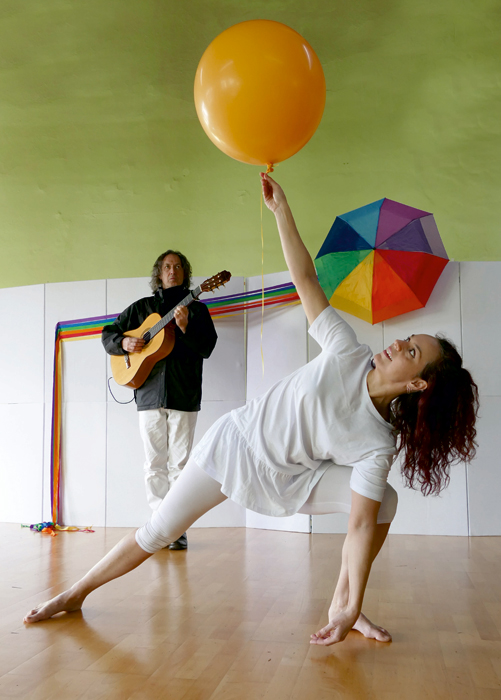Wriggle Dance Theatre, run by two co-directors - Lucy Knight and myself, strives to reach those who are least engaged in the arts due to social or economic disadvantage. Our outreach and performance work is intrinsically linked to our desire to include audiences as co-collaborators, sharing and testing ideas on families at every stage of the creative process.
As our understanding of child development has grown through our recent research, we have become increasingly aware of the impact that the tactile and sensory nature of our work has on families. Once we started to talk about it we quickly realised that the theme of ‘touch’ had many facets and could be explored from different perspectives, linking the arts and science; we also felt it would lend itself to creating a beautiful interactive dance piece - our next big show!
We became fascinated with the science behind touch after meeting neuroscientist, Dr Katerina Foutapolou from University College London, whose own ground-breaking research is incredibly exciting. Katerina’s research is based around a recent discovery that humans have two types of nerve fibres on the skin, which respond to touch in different ways. Affective touch, sometimes known as the nurturing touch, is mediated by a separate, specific C tactile fibre which only responds to a slow stroking touch; that is, as opposed to a faster, neutral touch which controls the perception of physical pain.
Katerina agreed to help us conduct some experiments, specifically on how the perception of touch changes depending on the environment and emotional relationship of those being touched, with reference to parent and child and children as peers. These experiments will take place during the next phase of our project’s development, once we have confirmed funding.
We then sought to identify further partners for the project. With a small amount of seed funding from Warwick Creative Exchange and Coventry University we attracted two more academics, Dr Sara Reed, Principal Lecturer and researcher in dance at Coventry University and Professor Sotaro Kita, Professor in psychology at Warwick University.
Sara has a wealth of knowledge and experience in dance, with a background in somatic practice and Feldenkrais, as well as an interest in Gestalt Therapy; she brought invaluable insight. Kita’s research explores the development of language and gesture in children. Particularly resonant with us was Kita’s interest in the idea of translation being at the centre of the process; for example, how do people translate tactile information into language? As dancers, this is something we do all the time and we are interested in how we can create a movement vocabulary to express how something feels.

Photo by Keiko Ikeuchi
The seed funding enabled us to meet with our academic collaborators to discuss our areas of research, how we could work together and what we wanted to achieve. It also allowed Lucy and I to go into the studio and begin to explore practical ideas around touch. We devised some creative dance workshops aimed at those who had little or no experience of the arts, which we delivered to 20 children (aged 2-3) and their parents/carers, at Coventry Central Library and to 30 Year 1 children at Charter Primary School, Coventry. Partnerships with Coventry Library Service and Warwick Arts Centre gave us direct access to children and families.
We have discovered that having time to do in-depth research, with no pressure yet for an end product, really helps with creating work that is relevant, engaging and full of integrity. Finding collaborators from different walks of life throws up new perspectives and ideas that you may not otherwise consider. It is also important to get input from your target audience to ensure the work connects.
Moving forward, we are fundraising so we can develop our ideas further with a full artistic team including performers, a digital artist and a set/costume designer. We will continue to consult with Sara, who will evaluate the project, and Katerina and Kita. We will test ideas and conduct science experiments with families through workshops and small performance sharings. This will then lead to the creation of a full touring show for small/mid-scale theatres, aimed at 2-8-year-olds and their families. The development phase will begin in January 2019, with a view to a national tour in 2020/21.
Kath Kimber-McTiffen
Co-Director, Wriggle Dance Theatre
Wriggle Dance Theatre is a Midlands based company that produces performances for young children and their families. The company looks to capture an audience’s imagination by pushing the boundaries of performance to create playful, interactive experiences with contemporary dance theatre. Wriggle also runs an extensive outreach programme.